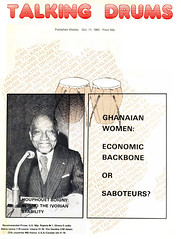Comment - Is The System To Blame?
If the Limann administration and his ruling Peoples National Party had continued until the end of their term and elections had been held, would the people of Ghana have voted them out of office, or would the electoral process have been subverted by a corrupt regime?
All these questions and similar ones had to be faced as the saga of the Nigerian elections, and inaugurations, transitions, second terms and court battles have unfolded.
Now that the Nigerians have done it and emerged almost in one piece, could it have been done in Ghana? The general pattern in Nigeria during the elections was, of course in true African tradition, a drift towards the ruling party, but there were changes of varying degrees throughout the country.
Power changed hands in eight out of nineteen states and very powerful men became ordinary citizens the next day and even though there are many people left dissatisfied with the conduct of the elections, it cannot be denied that the will of the majority carried the day.
The slow and ponderous judicial machine is still playing its part in giving the needed support to those who feel aggrieved and the Chief Justice of Nigeria has shown that the judiciary can and will stand up to political rulers.
Even with a lot of help from the judiciary, not everybody is going to be entirely satisfied, not everybody ever is nor should be and the winners will be the first to admit that the system is not perfect.
But again, no system ever is perfect or indeed needs be perfect as the rulers of Ghana are finding out to their chagrin.
A lot of energy was spent in the early days of the PNDC arguing that electoral democracy was a sham and unsuitable to Ghanaian needs.
Spurious and questionable foreign experts were paraded to reinforce the proposition that electoral democracy was a farce and the PNDC Chair man never missed an opportunity to ridicule the absurdity of a piece of paper put in a box guaranteeing him any rights.
The problem is that in almost two years, he is yet to prove that his supposed people's democracy is any less of a sham than what he overthrew.
He can lay no claims to the people having any hand in choosing the select few with whom he rules the country. The turnover in the leadership has been very high, again nobody can suggest that the people have had any hand in deciding who stays and who leaves the ruling group.
Even the aberrations that occur during an ineffectual constitutional government, still continue during a 'revolution' whose excesses spokesmen of the regime defend as having been necessary to shock a people used to the bad old days.
And yet corruption still rages in Ghana, bags of fertilizer disappear into thin air, immature and irresponsible people get appointed into the highest positions and for every PNP functionary that was selling rice or sugar during the Limann regime, one need only replace it with a PDC or WDC member or "revolutionary militant."
Now that even the IMF and its prescriptions have been accepted wholesale by the PNDC and even the dreaded word 'devaluation' has been accepted in official language, the question that remains to be answered is "how can change be effected when the people find PNDC rule intolerable?"
All the crimes of the Limann administration have been repeated many times over, the about to-be-committed-crimes from which December 31, 1981 was supposed to save the nation, have all been perpetrated in worse forms; new and undreamt of terrors have been unleashed on the country; Brigadier Nunoo Mensah who asked the infamous question, 'hand-over to whom?" has admitted that it has all been an unmitigated disaster.
Flight-Lieutenant Rawlings has no faith in the ballot box, and during the times when the June 4 Movement provided his political base, he was fond of quoting J.F. Kennedy because he claimed if he quoted Fidel Castro sinister interpretations will be put on his words; his quotation used to be that those who make peaceful change impossible. make violent change inevitable. Does he wish more violence on this much-abused country that he claims to love so much? It is futile to launch the new peace offensive in his pronouncements when there is nothing in the actions of the regime to indicate that they have renounced violence as a political credo.
The system has been shown to work in Nigeria, imperfect though it might be, what is more. important changes have taken place. Is this a challenge other West African countries will dare take?
